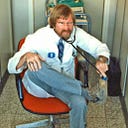This is a great backstory on the effects of that chemical compound (C8H10N4O2) we all (more or less) depend upon to get our physiological (and psychological) engines primed & running smoothly. However, it is noteworthy to observe that erstwhile ‘decaffeinated’ coffee, even with its ‘97% caffeine removed’ status, can still have an adverse effect on sleep if taken too close to bedtime. There are also the phytochemicals (left over after the decaffeination process has occurred) to be concerned with. It has been estimated that a 12 oz cup of Starsucks (sic) has anywhere from 3 to 18 mg of caffeine, since beans vary in the amount each contains (compare that to the 80mg of caffeine that an 8.4 oz can of ScarletBull…also sic…has). Then, too, there are varying amounts of caffeine in that favorite confection so many adhere to (chocolate). As a notoriously light sleeper, I have been forced to very carefully avoid any form of caffeine before bedtime and sometimes it’s difficult to resist having a bit of chocolate with or after dinner. And as for decaf coffee, as an old Berkeley-student-days reprobate, the very notion of being forced to switch from the fully-energised caffeinated coffee to its tamer decaffeinated cousin is heretical blasphemy. Life, however, is a continuous compromise, is it not? Thanks for sharing these interesting insights with us, Melissa. PS: In case anyone doesn’t know it, both the FitBit Ionic and the Apple 4+ smart watches have excellent sleep tracking capabilities that will give you a whole readout of useful data on sleep levels achieved each night. Now all they have to is come up with a caffeine-tracking app, eh? :)
2 min readMar 23, 2019
Written by Kalikiano Kalei
After many years in the medical profession (now retired), I am a professional student of the absurd (also a published author, poet & friend of wolves and dogs).
